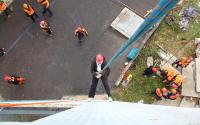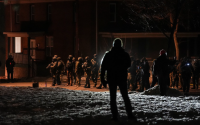31 August 2005Jamie Wilson in Baton Rouge and Julian Borger in Washington
Hundreds of people were feared to have died in Hurricane Katrina as more bodies washed up in US Gulf coast cities yesterday in the aftermath one of the worst natural disasters America has faced in decades.
President George Bush will cut short his holiday and return to Washington today to oversee recovery efforts in a region overwhelmed by floodwaters that have sent tens of thousands fleeing and left millions without power.
In New Orleans, those who survived the initial impact of the hurricane faced new dangers yesterday as its dykes gave way under the pressure of the storm surge.
With flood water reaching the eaves of some three-storey houses, rescue workers in boats and helicopters struggled to reach hundreds of victim trapped on roofs. Others were reported trapped in their attics across a city that is 70% below sea-level.
There were no official estimates for casualties, but officials were thought to be preparing for the possibility of hundreds of fatalities.
New Orleans officials moved the city administration out of town, and prepared to evacuate tens of thousands of people who had taken refuge in a sports stadium and in other shelters.
The hurricane's impact was quickly felt further afield. Oil prices surged to record highs above $70 a barrel as the market quailed at the prospect of supply disruptions in the Mexican Gulf.
Insurers were flinching at a clear-up cost estimated at $26bn, which would make Katrina the most expensive disaster in US history.
"Right now, our priority is on saving lives, and we are still in the midst of search and rescue operations," Mr Bush said. "We know that many are anxious to return to their homes. It's not possible at this moment."
Many homes in New Orleans were submerged by the surge of floodwater brought on by the storm. The mayor of New Orleans, Ray Nagin, said bodies were floating in high waters that covered most of the city.
"The city of New Orleans is in a state of devastation," he said on local television. "We probably have 80% of our city under water; with some sections of our city the water is as deep as 20 feet [6 metres]. We still have many of our residents on roofs. Both airports are under water."
On Canal Street, looters waded through hip-deep water and ripped open the steel gates on the front of clothing and jewellery stores.
"The looting is out of control. The French quarter has been attacked," said Jackie Clarkson, a New Orleans councillor.
In Biloxi, on the Mississippi Gulf coast, hundreds were feared dead after a 30-foot (9 metre) wave surged through the city. Waterfront casinos were torn open, and the beach was littered with steel girders. Dazed residents foraged for food and water and sniffer dogs were brought in to help find the dead.
"It was like our tsunami,"said Vincent Creel, the city spokesman. Asked how many people had died, he said: "It's going to be in the hundreds."
A Biloxi man, Harvey Jackson, told a local television station, WKRG-TV, that he feared his wife had been killed when she was ripped from his grasp after their home had been split in half by the storm.
"I held her hand as tight as I could," he said. "She told me, 'You can't hold me.' She told me to take care of the kids and the grandkids ... we ain't got nowhere to go. I'm lost. That's all I had."
In neighbouring Hancock county, 35 people were missing after an emergency operations centre flooded.
Across the Gulf coast, thousands of national guardsmen, some recently returned from Iraq, were mobilised to help with the search-and-rescue operation and to combat looting.
Rigorous evacuation procedures meant that the human cost of the storm was unlikely to top Hurricane Camille in 1969, which took 256 lives, let alone the Galveston storm of 1900, which killed more than 6,000 people, the worst natural disaster in US history.
However, Katrina could well become the most expensive storm the US has had to clean up, as it laid waste to much of the recent development along the Gulf coast.
The region's oil production accounts for a fifth of the nation's needs. Two offshore oil rigs broke free of their moorings, and one hit a bridge in Mobile, Alabama.
Katrina was downgraded to a tropical storm as it moved north into Tennessee and Kentucky but it continued to wreak havoc, spawning at least seven tornadoes in its wake, and emptying heavy rain into the Mississippi. The flooding river was certain to worsen the problems in the Mississippi Delta and in New Orleans.
More than 5 million people were left without electricity in Mississippi, Louisiana and Alabama, and in Florida, where Katrina first struck land last week.
http://www.guardian.co.uk/print/0,3858,5274375-1100878,00.html






